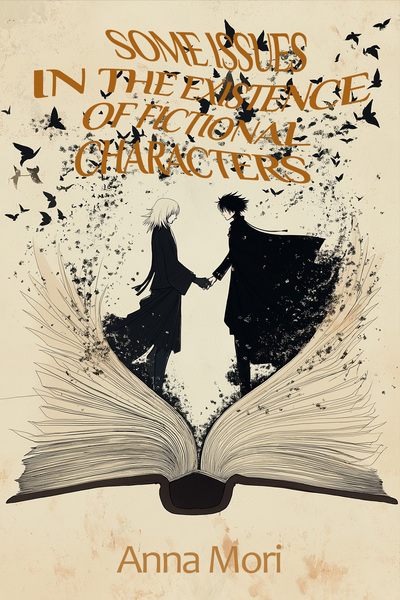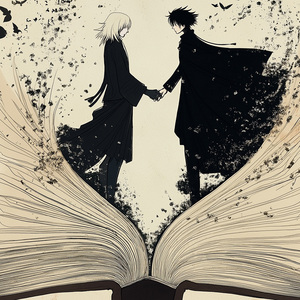On the twentieth day of that same moon, the governor of Sankoku province sent a mounted messenger to Makishima’s war camp with urgent news:
"The eastern lords loyal to Prince Akimitsu are marching on the capital with thirty thousand men. Their intent is to sever all roads and encircle your army."
Reinforcements for Morinaga and Makishima were expected to arrive soon, but Makishima saw an opportunity too valuable to ignore. He immediately detached a force of thirty thousand and devised a cunning plan. These men fashioned banners bearing the imperial chrysanthemum, and at nightfall, they slipped out of the capital through the western gate. Circling around, they approached the enemy lines from the east, banners raised high, posing as allies from the eastern provinces.
"Rejoice! The promised reinforcements have arrived!" Prince Akimitsu cried out upon spotting the banners adorned with the imperial chrysanthemum.
Yet while he exulted, the warriors bearing the false banners pressed closer. Then, all at once, a battle cry rang out, and up soared the true banners—those of the Morinaga clan. At that very moment, from the west, Makishima’s main force fell upon Akimitsu’s camp. Such was the cunning of Makishima’s plan.
Assailed from two sides, Akimitsu’s warriors faltered, confusion spreading like wildfire, just as Makishima had intended. Panic took hold, and chaos reigned before Akimitsu and Ryuzaki managed to rally their forces and mount a counterattack. But the victory was indisputably Makishima’s — after the battle, his samurai presented him with more than three thousand enemy heads.
Still, Prince Akimitsu had no thought of surrender. The war only escalated. Though his army was smaller than Morinaga’s, he possessed a weapon of his own — Kuro Ryuzaki, whose cunning was the equal of Makishima Shougo’s. At the start of the seventh moon, Ryuzaki discovered and poisoned the underground springs that supplied the city with water. Illness swept through the capital. Even among the common folk — those few who, for whatever reason, had not fled — men and women fell sick and perished.
Makishima soon discerned the cause and ordered his forces to bring in water from beyond the city, forbidding them from drinking the poisoned supply until the wells ran clean. But the damage was already done—the dead were beyond counting.
Both armies were nearing their limits, but time was Makishima Shougo’s ally. His superior numbers gradually wore the enemy down, and one by one, he took control of the city’s gates. Both sides depended on provisions from distant provinces, and with the roads under his control, Makishima sought to cut Akimitsu’s army off from all supplies, forcing their capitulation. One by one, the gates fell. Only a single one remained.
By then, nearly the entire northern quarter of the city lay in ruins. No words could capture the capital’s former beauty! Now, its roads were torn asunder, its dwellings collapsed or devoured by fire. Before the people's very eyes, their flourishing city had, in the span of three moons, become a wasteland.
"Is this the end of the capital, which has stood through three turnings of the century?" they murmured in dread.
Even the cold-hearted Makishima Shougo found it painful to witness his beloved city in such a state — what, then, must Prince Akimitsu have felt, with his sensitive soul? His heart ached with sorrow; he grieved for the past and long regretted the day he had staked his claim to the throne, setting in motion a war that had brought nothing but devastation to the land and suffering to its people.
On the twentieth day of the eighth moon, he formally renounced his claim and took monastic vows, forsaking the transient world. Clad in rough black robes, he cast aside all earthly ties, hoping to put an end to the fratricidal war.
But alas, it was too late. By now, the wounds inflicted by both sides ran too deep. Not even a prince’s retreat into the clergy could quell the turmoil.
Shortly after taking his vows, Prince Akimitsu — now called Saigyo, He Who Walks West — sent a messenger to Kuro Ryuzaki, his dearest friend and milk-brother. Upon a single leaf of paper, he had inscribed a poem:
The cold mountain wind...
Here, in the halls of Buddha,
I shiver just as I did
In the Palace of Spring.
Is there any place in this world
Where sorrow’s tidings do not reach?
When Ryuzaki read these lines, grief overcame him. He saw that renouncing the world had brought the prince no peace.
That melancholy verse was the last message he ever received from him.
Now, the only heir to the throne was the unborn child of Lady Ageha. Morinaga rejoiced. Yet cautious as ever, Makishima was already plotting Akimitsu’s death.
"Are you certain this is necessary?" Yoshifusa Morinaga asked. "Can a prince who has taken monastic vows truly claim the throne?"
"Better to be rid of him once and for all!" Makishima replied. "History has seen emperors who shed their worldly robes and took the tonsure, not out of piety, but out of fear of their enemies — only to return to the world once those enemies had been vanquished. And Akimitsu, who has long yearned for the throne, is all the more likely to do the same!"
After his ordination, Akimitsu retreated to the Monastery of Pure Waters, nestled upon the sacred Mountain of the Sun’s Radiance, for his own estate had long since burned in the fires that ravaged the capital.
Makishima first considered sending a detachment to storm the monastery but decided against it. Attacking monks would stain his family’s name. Instead, he turned to deception. He arranged a secret meeting with the abbot, offering him a generous reward in exchange for one small favor — simply to turn a blind eye when Makishima’s assassins came.
The abbot hesitated, troubled by the weight of such a sin. Yet he feared the power of the Morinaga clan. He knew that if he refused, his monastery would suffer the consequences. At last, he relented.
And so, ignobly, at the hands of masked killers, Prince Akimitsu met his end.
At first, the world did not even know he had died.
Truly, is it not always the purest of heart who are first to be claimed by war?
It seemed that fortune favored the Morinaga family, yet Yoshifusa Morinaga had not received a single letter from his daughter in the past three moons. Had something happened to her? Was she well? Would she safely bring her child into the world? — These thoughts tormented him. Driven by worry, the lord sent messengers to his home province of Yoshino, but none returned.
At the start of the ninth moon, a chilling rumor spread: Lady Ageha, following in Prince Akimitsu’s footsteps, had renounced her claim to the throne, having fallen gravely ill and lost her child. Dismay and fear swept through the land—only recently, there had been two heirs, and now there were none. What was to be done? Then came an even greater shock: Lady Ageha publicly confessed that it was by her own hand that her husband, Emperor Akihiko, had perished. She was immediately taken into custody.
It was soon learned that Lady Ageha was being held just outside the capital, in the Willow Manor, under the watch of Samurai Isinori Kano — a high-ranking officer of the Investigative Bureau, a loyal vassal of Akimitsu, and a staunch supporter of Kuro Ryuzaki.
Makishima set out for the manor at once. Upon reaching its gates, he addressed the samurai guards standing watch:
"I come not as an enemy, but as a humble petitioner—a kinsman who cares for his cousin more than for his own flesh and blood. I have heard that Lady Ageha, my dear relative, is imprisoned here, awaiting trial, and that she is gravely ill. I beg you, grant me a kindness! I wish to see her once more, to exchange even a few words—for who knows if we shall ever meet again?"
The warriors, armed to the teeth yet not made of stone, were moved to tears by his plea.
"There is no law forbidding it," they replied and, taking pity on him, allowed him inside.
Lady Ageha sat in the corner of the room, her head bowed, struggling to stifle her sobs. She did not notice his entrance at first, but when she did—ah, the way her face lit up! It was the expression of a lost soul glimpsing the Buddha’s golden thread descending into the depths of hell.
Not long ago, there had been no woman in the capital fairer than Ageha — delicate and graceful, her skin white as snow, her hair long and thick, her beauty famed throughout the land. But now, before Makishima stood a woman hollowed by suffering, wasted and frail, as though thirty years had passed, not three moons.
For a long while, he could not bring himself to speak. At last, he murmured:
"Is it truly you, Ageha? Where is your hair, dark and lustrous as a kingfisher’s wing?"
"Know this — it was not of my own will that I lost it..."
She pulled back the folds of her robe, revealing her shoulders and chest, covered in dreadful bruises and welts.
"And what use have I for my hair now?" she continued bitterly. "I regret only that I could not leave you even a single lock as a keepsake..."
And then Makishima saw it — beyond the bruises, beyond the wounds—something irreparable. Her belly was hollow and empty, like a beggar’s sack.
Darkness clouded his vision. His heart clenched in his chest, and he trembled as he asked:
"What has been done to you?"
"As you know," Ageha whispered, "I set out for Yoshino, as my father commanded. But no sooner had I left the capital than my carriage was ambushed. My servants were slaughtered, and I was taken captive by that wretched Kuro Ryuzaki. He tormented me without end, demanding that I confess, before witnesses, that it was I who poisoned my husband with mercury. Oh, the horror of it — I did not know such tortures existed! When demons punish sinners in the depths of hell, their agonies cannot be greater than those I endured! But I bore it all, day after day...
"...until the day I realized my child no longer stirred within me.
"That day, I could bear it no longer. And so, through my tears, I told my tormentor everything."
As she spoke, her weeping poured forth like a river, endless and unrelenting.
"So it is true, then — you have lost the child, the heir to the throne?" Makishima asked, though he had already understood it all. Yet speaking the words aloud only made the sorrow cut deeper.
"Yes. No doubt it is punishment for the sins I have committed in this life. Just as a loyal vassal does not serve two masters, an honest woman cannot belong to one man and love another. And to wish for one’s husband's death — what a dreadful crime... Ah, Brother Shougo, all I wished for was to see you once more! Locked away here, knowing nothing of the war’s course, I wondered — are you and Father still alive, or have you already perished? I dreamt only of meeting you again! That hope alone kept me alive, through all the torment of body and soul, until this very day. But now, I have no regrets left in this world. I can die in peace..."
"Sister, how can you speak this way? No matter how terrible your crime, there can be no question of execution! My father and I will go before Kuro Ryuzaki, however repugnant it may be to abase ourselves before that dishonorable man, and we will beg him to show you mercy — to allow you to live in peace, far from the capital."
"No, Brother Shougo, I have thought it through. There is no path left for me but death. Even if I were granted exile to some remote corner of the land, I would still bear the stain of disgrace for the rest of my days. And worse still — each time I close my eyes, I see Kuro Ryudzaki again, and in my dreams, I relive the agony of his merciless tortures. No, I would rather die than endure such suffering, such despair! My only fear is that even in the lives to come, my tormented soul will find no peace — that I will never be free of these horrors..."
"You are not the only one who grieves and weeps." Makishima’s voice grew heavy. "Think of what lies on my heart. Your confession has brought our family to the brink of ruin! I was but a step away from victory, and now I am the brother of a traitor. I do not even know if I will be able to keep my own head on my shoulders..." He turned to leave, but the wretched Lady Ageha clung to his sleeves, pleading, "How can you be so cold to me? At least stay a little longer!" She would not let him go.
At last, Makishima spoke, his tone gentler:
"Be strong, Sister. We must part now — we cannot keep the guards waiting too long. Even if this is our last meeting in this life, we are destined to meet again in the next, though we are not bound by vows of marriage."
And with that, he left. Yet even as he stepped beyond the gates, Lady Ageha’s sobs still echoed behind him.
Indeed, a human life is no more than a frail boat tossed upon the whim of the waves. Only days ago, the Morinaga rejoiced, believing the throne within their grasp. And now, the crime of Lady Ageha, revealed before the world, had cast their name into disgrace. So true are the words of the great poet: ‘Joy passes, and sorrow follows in its wake.’
Makishima went at once to Lord Yoshifusa Morinaga, recounting all he had seen and heard. He urged his uncle not to despair, arguing that Ageha’s confession, wrung from her under torture, could not be considered truth, and that there was still time to set things right. But upon hearing of his daughter’s fate, Lord Yoshifusa was consumed by grief. He resolved to surrender himself, humbly pleading with Ryuzaki for Ageha’s life, despite Makishima’s furious objections.
Clad in white robes, carrying neither bow nor arrows, accompanied only by a handful of riders, Lord Yoshifusa rode to Ryuzaki’s encampment.
At that very moment, troubling whispers had reached Kuro Ryuzaki’s ears — rumors of Prince Akimitsu’s death. The monks of the Pure Water Monastery, too ashamed and terrified to speak of it, had tried to suppress the news, and so the truth had not yet spread widely. Even before this, Ryuzaki had been bitter that he had failed to extract Ageha’s confession before Akimitsu withdrew from the world. And now, learning that his master, his friend, his brother had perished — so dishonorably, so wretchedly — he was left asking himself: What was it all for?
Overcome by grief and rage, he looked up and saw Yoshifusa approaching. Without a word, he seized his bow, drew an arrow as long as fifteen handspans, and pulled back the string with all his might. But just then, his page spoke up:
"My lord, such an act would not be just! Though the Morinaga have done much wrong, look — Lord Yoshifusa comes unarmed, unarmored. He does not seek battle, but surrenders himself, no doubt to beg for his daughter’s life. I implore you, hear him out! You are known far and wide for your wisdom and impartial judgment as the head of the Investigative Bureau."











Comments (0)
See all